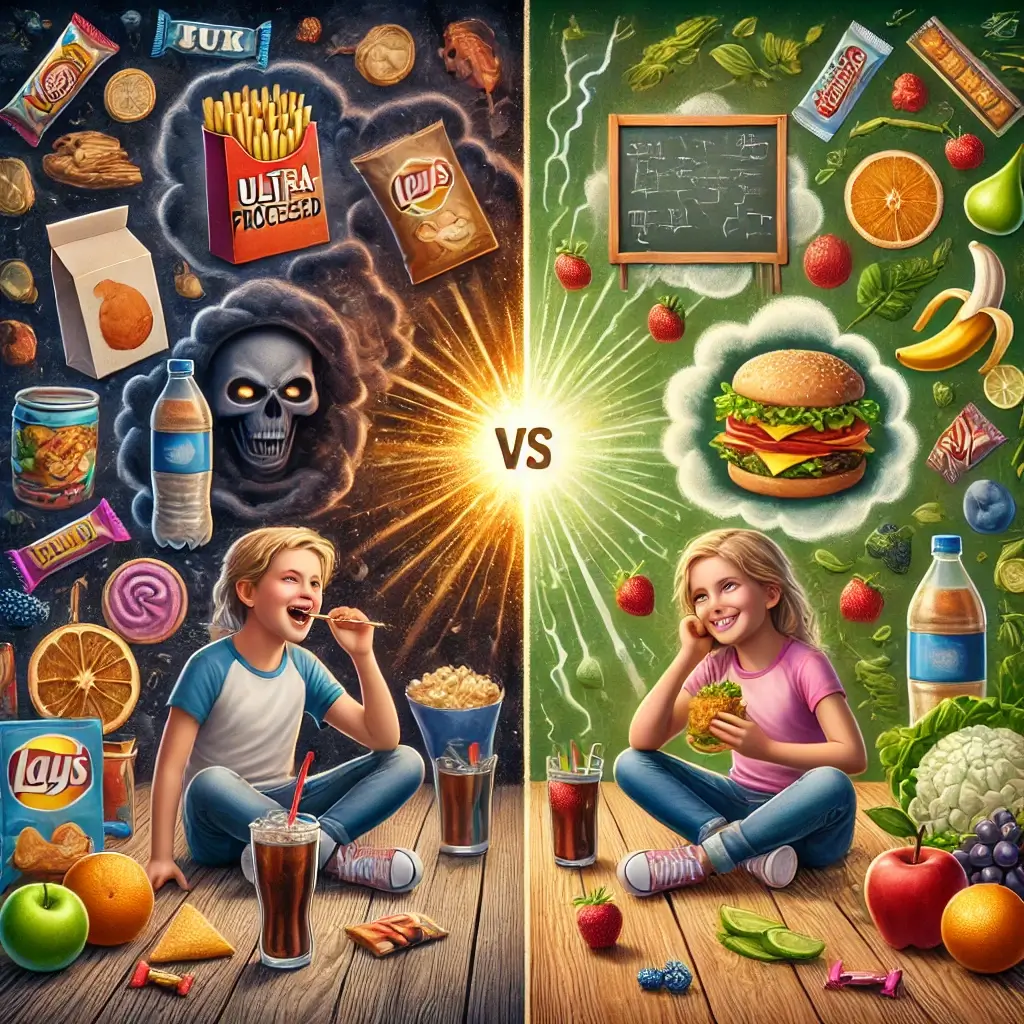Breaking the Ultra-Processed Food Cycle: Evidence-Based Solutions for Your Child’s Health
The Growing Concern of Ultra-Processed Foods
In today’s fast-paced world, ultra-processed foods for busy families have become a convenient choice for many families. Packaged snacks, ready-to-eat meals, and sugary beverages are often quick solutions for busy parents. However, research reveals that these foods pose significant risks to children’s health and development, far beyond the commonly discussed concerns of obesity and poor nutrition.
Expert Insights on UPF Impact
Dr. Sarah Thompson, a pediatrician specializing in developmental nutrition and children’s health, warns, “Ultra-processed foods are designed for taste and convenience, but they lack the nutrients essential for growth and learning. Worse, their high levels of additives and sugars can actively disrupt a child’s development.” Studies have linked diets high in UPFs to behavioral challenges, learning difficulties, and even long-term physical health issues.
This article explores how UPFs affect children’s development, helps you recognize warning signs, and offers practical steps to improve your family’s diet without overwhelming your routine.
Understanding UPF Impact on Child Development
The connection between food and brain development is profound. essential nutrients for cognitive development like omega-3 fatty acids, iron, and zinc play critical roles in building memory, attention, and problem-solving skills. Unfortunately, UPFs often lack these essential nutrients and instead contain additives that may hinder cognitive and emotional development.
Research-Backed Evidence on Attention and Memory
A 2024 study in the Journal of Pediatric Nutrition found that children consuming high-UPF diets experienced a 25% decline in memory performance and increased difficulty maintaining attention during tasks.
Behavioral and Emotional Impact
artificial additives in processed foods such as artificial colors and preservatives can trigger mood swings, irritability, and hyperactivity. Research from Nutritional Psychology Review (2024) highlights a 35% increase in emotional instability among children with high-UPF diets.
Physical Health Implications
The effects of UPFs are not limited to cognitive and behavioral issues. These foods also disrupt physical growth and health in various ways. growth patterns in children with UPF-heavy diets show hormonal imbalances caused by excessive sugar and unhealthy fats can interfere with normal growth patterns.
Warning Signs for Parents
Parents may not immediately connect certain behavioral or physical symptoms to diet, but it’s crucial to recognize these red flags: behavioral changes from ultra-processed foods include difficulty focusing on tasks, following instructions, frequent mood swings, irritability, and trouble sleeping.
Practical Solutions for Families
Making dietary changes can feel daunting, but transitioning away from processed foods can be achieved through small, consistent steps. Here are practical ways to transition your family toward a healthier diet.
Starting Small with Diet Changes
implementing gradual dietary improvements starts with replacing one UPF snack each day with a healthier option, like fresh fruit, nuts, or homemade trail mix. Introduce whole-grain bread and pasta instead of white, processed versions.
Engaging Children in Healthy Eating
involving children in meal preparation increases their likelihood of trying new foods. Let them help with choosing fruits and vegetables at the store and preparing simple meals or snacks.
Technology-Assisted Healthy Eating
Use digital tools to simplify healthy eating: apps for tracking processed food consumption like MyFitnessPal can help monitor UPF intake. Recipe platforms like SuperCook allow you to find recipes based on ingredients you already have.
Meal Planning Strategies
effective meal planning for busy families includes setting aside time each week to prepare healthy meals and snacks in advance, batch cooking large portions of soups, stews, or casseroles, and organizing your kitchen to promote healthy choices.
Professional Support and Resources
Consult a pediatric nutritionist for personalized advice and join support groups for healthy family eating focused on reducing processed foods.
Impact of Dietary Changes
The good news is that reducing UPF consumption doesn’t have to mean eliminating them completely. benefits of reducing processed food intake showed that families who reduced UPF intake by just 25% saw a 20% improvement in their children’s attention span and learning abilities, and a 30% reduction in behavioral issues within three months.
Final Thoughts
As parents, we hold the power to shape our children’s health and development through the choices we make in the kitchen. While ultra-processed foods are convenient, their long-term effects on growth, learning, and behavior demand our attention. By taking small, consistent steps to reduce UPFs and increase whole food consumption, we can foster healthier, happier futures for our children.
Expert Perspective
Dr. Thompson’s advice resonates: “Every meal is an opportunity to nurture your child’s potential. It starts with awareness and a commitment to change.”
Research References
comprehensive studies on ultra-processed foods and child development:
Journal of Pediatric Nutrition (2024). “Ultra-Processed Foods and Cognitive Development in Children.”
Nutritional Psychology Review (2024). “Behavioral Consequences of Additive-Heavy Diets in Children.”
Pediatric Health Outcomes Research (2024). “Impact of Diet on Physical Growth Patterns in Youth.”
Brain Development Studies (2024). “Dietary Patterns and Neuroplasticity in Childhood.”
Child Development Quarterly (2024). “The Long-Term Effects of Ultra-Processed Foods on Development.”













